整合Mybtis对于Spring Boot来说,是非常简单的, 通过这一篇文章, 你可以无压力快速入门,不过开始之前我要说一下我的版本信息:
maven 3.2.5
jdk 1.8
Spring Boot 2.1.6
创建项目
依然是使用idea的自动化配置, 不过这里,我们需要勾选以下依赖:
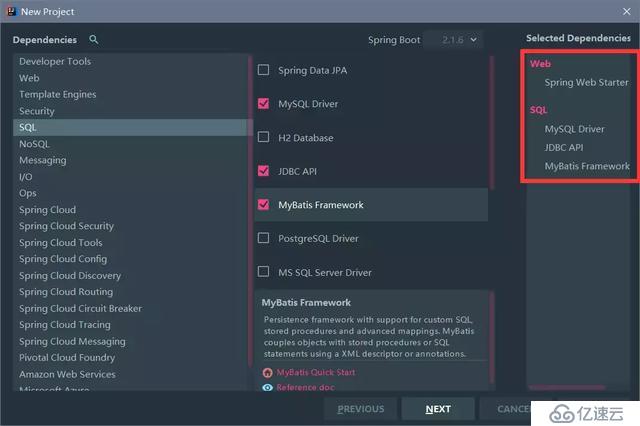
如果你勾选了 MyBatis , 你会发现你的pom文件里有 :
<dependency>
<groupId>org.mybatis.spring.boot</groupId>
<artifactId>mybatis-spring-boot-starter</artifactId>
<version>2.1.0</version>
</dependency>这条依赖
只要是带 *-spring-boot-starter的,都是Spring Boot官方推荐的, 这里的mybatis就是, 让我们来看一下mybatis包下的所有包:
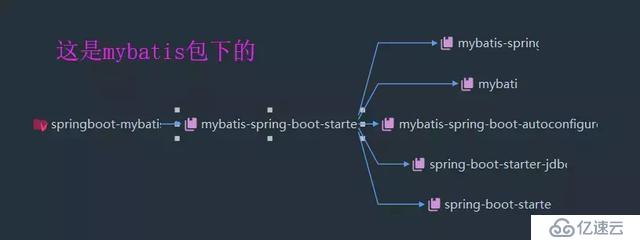
我们发现它引入了, mybatis-spring 的包等等,以及还有mybatis-spring-boot-autoconfigure, 这个是自动配置的意思, 对于Spring Boot来说,自动配置是一大特点
配置Druid数据源
Spring Boot2.x的数据源 hikari 的, 而1.x则是 Tomcat的, 所以我们要配置以下自己的数据源
<dependency>
<groupId>com.alibaba</groupId>
<artifactId>druid</artifactId>
<version>1.1.16</version>
</dependency>引入这个依赖就好了
然后在 application.yml 配置文件下:
spring:
datasource:
password: root
username: root
url: jdbc:mysql://localhost:3306/mybatis?serverTimezone=UTC
driver-class-name: com.mysql.cj.jdbc.Driver
type: com.alibaba.druid.pool.DruidDataSource
initialSize: 5
minIdle: 5
maxActive: 20
maxWait: 60000
timeBetweenEvictionRunsMillis: 60000
minEvictableIdleTimeMillis: 300000
validationQuery: SELECT 1 FROM DUAL
testWhileIdle: true
testOnBorrow: false
testOnReturn: false
poolPreparedStatements: true
# 配置监控统计拦截的filters,去掉后监控界面sql无法统计,'wall'用于防火墙
filters: stat,wall,log4j
maxPoolPreparedStatementPerConnectionSize: 20
useGlobalDataSourceStat: true
connectionProperties: druid.stat.mergeSql=true;druid.stat.slowSqlMillis=500下面这一堆的属性是不生效的, 如果想要生效, 需要特殊配置一下, Druid监控也配置了:
package com.carson.config;
import com.alibaba.druid.pool.DruidDataSource;
import com.alibaba.druid.support.http.StatViewServlet;
import com.alibaba.druid.support.http.WebStatFilter;
import org.springframework.boot.context.properties.ConfigurationProperties;
import org.springframework.boot.web.servlet.FilterRegistrationBean;
import org.springframework.boot.web.servlet.ServletRegistrationBean;
import org.springframework.context.annotation.Bean;
import org.springframework.context.annotation.Configuration;
import javax.sql.DataSource;
import java.util.Arrays;
import java.util.HashMap;
import java.util.Map;
@Configuration
public class DruidConfig {
@ConfigurationProperties(prefix = "spring.datasource")
@Bean
public DataSource druid() {
return new DruidDataSource();
}
// 配置 Druid 监控
//1) 配置一个管理后台的Servlet
@Bean
public ServletRegistrationBean statViewServlet() {
ServletRegistrationBean bean = new ServletRegistrationBean(new StatViewServlet(), "/druid/*");
Map<String, String> initParams = new HashMap<>();
// 这里是 druid monitor(监视器)的 账号密码, 可以任意设置
initParams.put("loginUsername", "admin");
initParams.put("loginPassword", "123456");
initParams.put("allow", "");
initParams.put("deny", "192.123.11.11");
// 设置初始化参数
bean.setInitParameters(initParams);
return bean;
}
// 2)配置一个监控的 filter
@Bean
public FilterRegistrationBean webStatFilter() {
FilterRegistrationBean bean = new FilterRegistrationBean();
bean.setFilter(new WebStatFilter());
Map<String, String> initParams = new HashMap<>();
initParams.put("exclusions","*.js,*.css,/druid/*");
bean.setInitParameters(initParams);
bean.setUrlPatterns(Arrays.asList("/*"));
return bean;
}
}启动主类, 查看是否可以进入到 德鲁伊监视器, 如果你报错了请添加 log4j 依赖:
<dependency>
<groupId>log4j</groupId>
<artifactId>log4j</artifactId>
<version>1.2.17</version>
</dependency>
<!--我也不清楚为什么, 不加log4j的话就会报错-->查看效果:
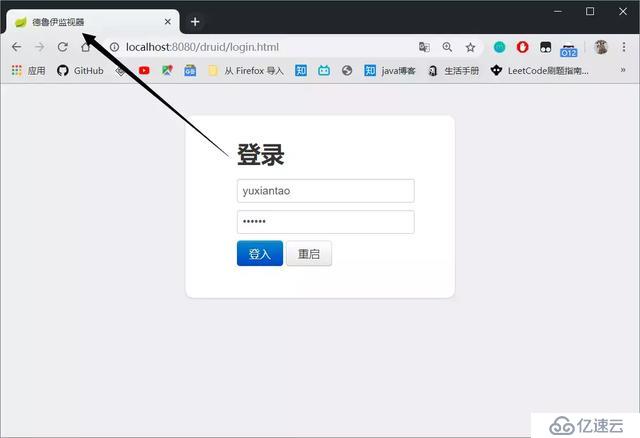
利用SpringBoot建表
然后在 resources/sql 下引入两个建表的sql文件:
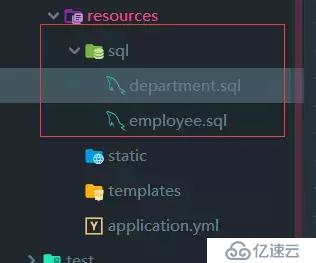
department.sql:
SET FOREIGN_KEY_CHECKS = 0;
-- ----------------------------
-- Table structure for department
-- ----------------------------
DROP TABLE IF EXISTS `department`;
CREATE TABLE `department` (
`id` INT(11) NOT NULL AUTO_INCREMENT,
`departmentName` VARCHAR(255) DEFAULT NULL,
PRIMARY KEY (`id`)
)
ENGINE = InnoDB
AUTO_INCREMENT = 1
DEFAULT CHARSET = utf8;employee.sql:
SET FOREIGN_KEY_CHECKS = 0;
-- ----------------------------
-- Table structure for employee
-- ----------------------------
DROP TABLE IF EXISTS `employee`;
CREATE TABLE `employee` (
`id` INT(11) NOT NULL AUTO_INCREMENT,
`lastName` VARCHAR(255) DEFAULT NULL,
`email` VARCHAR(255) DEFAULT NULL,
`gender` INT(2) DEFAULT NULL,
`d_id` INT(11) DEFAULT NULL,
PRIMARY KEY (`id`)
)
ENGINE = InnoDB
AUTO_INCREMENT = 1
DEFAULT CHARSET = utf8;并且在 application.yml 文件下写入:
schema: - classpath:sql/department.sql - classpath:sql/employee.sql initialization-mode: always

schema`是与 password/username 等等同级的,哦对了, 如果你是 springboot 2.x版本以上的, 你可能需要加上initialization-mode这个属性。
运行主类, 查看是否建表成功,
如果你的程序在设置sql文件后 启动报错了:
重启 idea (重启大法好啊!)
查看 schema是否配置对了 sql文件的名字
schema:
-(空格)classpath:sql/xxx.sql
注意格式
对应数据库实体类
Employee.java
package com.carson.domain;
public class Employee {
private Integer id;
private String lastName;
private Integer gender;
private String email;
private Integer dId;
public Integer getId() {
return id;
}
public void setId(Integer id) {
this.id = id;
}
public String getLastName() {
return lastName;
}
public void setLastName(String lastName) {
this.lastName = lastName;
}
public Integer getGender() {
return gender;
}
public void setGender(Integer gender) {
this.gender = gender;
}
public String getEmail() {
return email;
}
public void setEmail(String email) {
this.email = email;
}
public Integer getdId() {
return dId;
}
public void setdId(Integer dId) {
this.dId = dId;
}
}Department.java
package com.carson.domain;
public class Department {
private Integer id;
private String departmentName;
public Integer getId() {
return id;
}
public void setId(Integer id) {
this.id = id;
}
public String getDepartmentName() {
return departmentName;
}
public void setDepartmentName(String departmentName) {
this.departmentName = departmentName;
}
}记得把刚才我配置文件的 schema属性全部注释掉, 我们不希望下次运行的时候会再次创建表
数据库交互
- 注解版
建立一个 Mapper, 把sql语句直接写在上面
package com.carson.mapper;
import com.carson.domain.Department;
import org.apache.ibatis.annotations.*;
// 指定这是一个 mapper
@Mapper
public interface DepartmentMapper {
@Select("select * from department where id=#{id}")
public Department getDepById(Integer id);
@Delete("delete from department where id=#{id}")
public int deleteDepById(Integer id);
@Insert("insert into department(departmentName) values(#{departmentName})")
public int insertDept(Department department);
@Update("update department set departmentName=#{departmentName} where id=#{id}")
public int updateDept(Department department);
}然后写一个Controller :
package com.carson.controller;
import com.carson.domain.Department;
import com.carson.mapper.DepartmentMapper;
import org.springframework.beans.factory.annotation.Autowired;
import org.springframework.web.bind.annotation.GetMapping;
import org.springframework.web.bind.annotation.PathVariable;
import org.springframework.web.bind.annotation.RestController;
@RestController // 代表返回 json 数据的 controller
public class DeptController {
@Autowired
DepartmentMapper departmentMapper;
@GetMapping("/dept/{id}")
public Department getDept(@PathVariable("id") Integer id) {
return departmentMapper.getDepById(id);
}
@GetMapping
public Department inserDept(Department department) {
departmentMapper.insertDept(department);
return department;
}
}通过 @PathVariable 可以将 URL 中占位符参数绑定到控制器处理方法的入参中:URL 中的 {xxx} 占位符可以通过@PathVariable(“xxx“) 绑定到操作方法的入参中。
启动主类, 输入这个: localhost:8080/dept?departmentName=AA , 这是往数据库增加一条数据:

然后查询: localhost:8080/dept/3 , 我数据库id是3, 所以我要查询3:
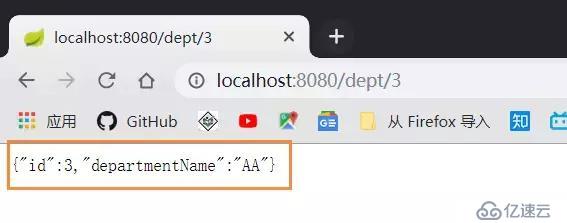
不过发现一个问题, 在插入数据的时候获取不到 id:

所以我们要使用一个@Options注解:
@Options(useGeneratedKeys = true,keyProperty = "id")
@Insert("insert into department(departmentName) values(#{departmentName})")
public int insertDept(Department department);添加到刚才 mapper中insert 的 @value注解上面
useGeneratedKeys : 使用生成的主键
keyProperty: 意思是 Department 里面的哪个属性是主键, 就是我们的 id
试着插入一条数据:

但是实际忘记注释掉 schema , 导致每次运行都会重新创建数据库, 各位要注意
还有一个问题
我们把数据库的字段名改成 department_name 而实体类是departmentName;
并且把sql语句也改正
@Options(useGeneratedKeys = true,keyProperty = "id")
@Insert("insert into department(department_name) values(#{departmentName})")
public int insertDept(Department department);
@Update("update department set department_name=#{departmentName} where id=#{id}")
public int updateDept(Department department);然后在进行查询操作的话:

我们发现获取不到 departmentName 了, 以前Spring 我们是使用配置文件来应对这种情况的, 但是我们现在没有了xml文件,我们该怎么办呢?
世上无难事
创建自定义配置类:
package com.carson.config;
import org.mybatis.spring.boot.autoconfigure.ConfigurationCustomizer;
import org.springframework.context.annotation.Bean;
import org.springframework.context.annotation.Configuration;
@Configuration
public class MyBatisConfig {
@Bean
public ConfigurationCustomizer configurationCustomizer() {
return new ConfigurationCustomizer() {
@Override
public void customize(org.apache.ibatis.session.Configuration configuration) {
configuration.setMapUnderscoreToCamelCase(true);
}
};
}
}注意这里面的 setMapUnderscoreToCamelCase,意思是:

翻译大法好啊, 我的英文太差了, 再次访问 http://localhost:8080/dept/1 查询操作, 我发现已经不是 null了:
{"id":1,"departmentName":"jackMa"}马总正确的展现出来了!
MapperScan注解
扫描器, 用来扫描mapper接口的
我把它标记到 启动类 上(你可以标记在任何地方):
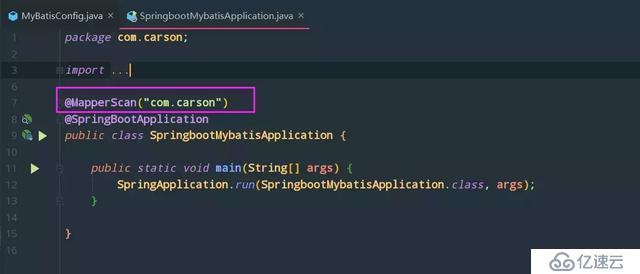
指定一个包,它会扫描这个包下所有的 mapper 接口, 防止你的mapper文件太多, 并且忘记加 @mapper 注解, 这样可以提高正确性
- 配置文件版
注解版貌似很方便, 但是如果遇到复杂的sql , 比如动态sql等等, 还是需要用 xml 配置文件的;
创建一个 Employee 的Mapper接口:
package com.carson.mapper;
import com.carson.domain.Employee;
public interface EmployeeMapper {
public Employee getEmpById(Integer id);
public void insertEmp(Employee employee);
}在 resources/mybatis 下创建一个 mybatis-config.xml 全局配置文件:
<?xml version="1.0" encoding="UTF-8" ?>
<!DOCTYPE configuration PUBLIC "-//mybatis.org//DTD Config 3.0//EN"
"http://mybatis.org/dtd/mybatis-3-config.dtd">
<configuration>
</configuration>在 resources/mybatis/mapper 包下创建 EmployeeMapper.xml 映射文件:
<?xml version="1.0" encoding="UTF-8" ?>
<!DOCTYPE mapper
PUBLIC "-//mybatis.org//DTD Mapper 3.0//EN"
"http://mybatis.org/dtd/mybatis-3-mapper.dtd">
<!-- 绑定接口 并且写两条 SQL 语句-->
<mapper namespace="com.carson.mapper.EmployeeMapper">
<select id="getEmpById" resultType="com.carson.domain.Employee">
select * from employee where id = #{id}
</select>
<insert id="insertEmp">
insert into employee(lastName,email,gender,d_id) values (#{lastName}, #{email},#{gender},#{d_id})
</insert>
</mapper>然后再 application.yml 配置文件下添加一条配置:
# mybatis属性是跟 spring 属性平级的, 千万不要把格式搞错
mybatis:
# 指定全局配置文件
config-location: classpath:mybatis/mybatis-config.xml
# 指定 mapper 映射文件, * 代表所有
mapper-locations: classpath:mybatis/mapper/*.xml让我们在刚才的DeptController类里添加一段 Controller :
@Autowired
EmployeeMapper employeeMapper
@GetMapping("emp/{id}")
public Employee getEmp(@PathVariable("id") Integer id) {
return employeeMapper.getEmpById(id);
}启动主类访问一下 localhost:8080/emp/1 , 查看结果:
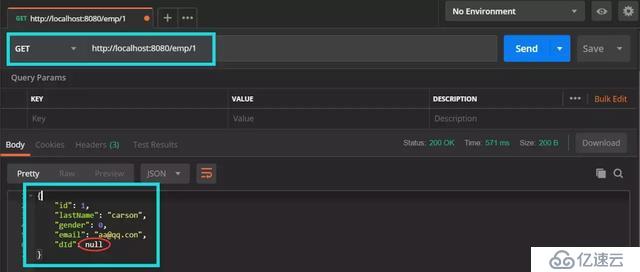
我们发现 dId没有查询出来, 这是因为 数据库字段是 d_id , 而java里是 dId , 所以我们要像刚才注解版一样, 配置一样东西, 让我们打开 mapper全局配置文件添加:
<?xml version="1.0" encoding="UTF-8" ?>
<!DOCTYPE configuration PUBLIC "-//mybatis.org//DTD Config 3.0//EN"
"http://mybatis.org/dtd/mybatis-3-config.dtd">
<configuration>
<settings>
<setting name="mapUnderscoreToCamelCase" value="true"/>
</settings>
</configuration>mapUnderscoreToCamelCase : 是否开启自动驼峰命名规则(camel case)映射,即从经典数据库列名 A_COLUMN 到经典 Java 属性名 aColumn 的类似映射。
再次试验:
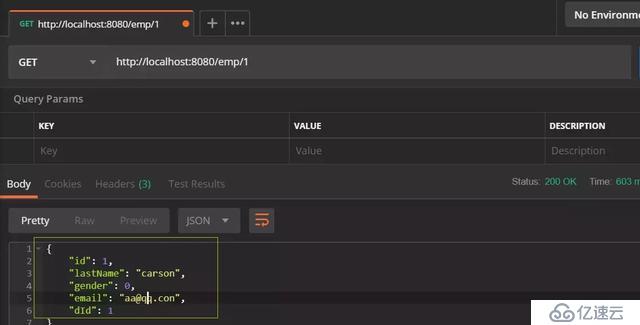
可以看出已经成功了
无论是哪种版本. 要根据自己的实际情况来定, 注解虽然方便, 但是复杂业务的就不行了
亿速云「云服务器」,即开即用、新一代英特尔至强铂金CPU、三副本存储NVMe SSD云盘,价格低至29元/月。点击查看>>
免责声明:本站发布的内容(图片、视频和文字)以原创、转载和分享为主,文章观点不代表本网站立场,如果涉及侵权请联系站长邮箱:is@yisu.com进行举报,并提供相关证据,一经查实,将立刻删除涉嫌侵权内容。